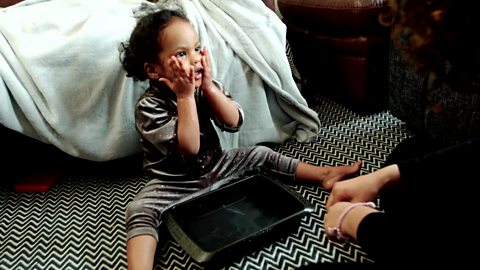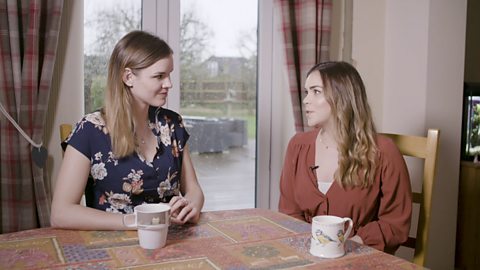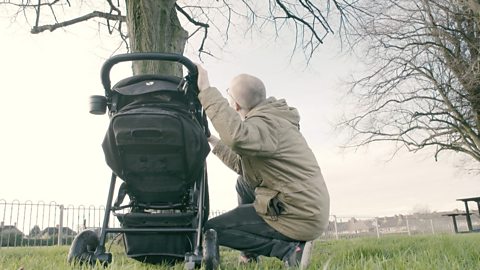Home > Tips and advice > Play
Whether at nursery, chatting to a health visitor, or looking online for activity ideas - sensory play is one of those terms that you might hear quite a lot when you have a young child.
But what does sensory play actually mean? And why does everyone keep going on about it? WeŌĆÖve been chatting to Specialist Speech and Language Therapist Alys Mathers to find out the benefits of sensory play.
What is sensory play?
Sensory play is any activity that stimulates at least one of your childŌĆÖs senses. This could be hearing, sight, touch, smell or taste. It also includes play that involves movement or balance.
You might have seen other parents using play dough, cold pasta or making their own sensory box. But sensory play can be a lot simpler than that.
Painting with your fingers, splashing in the bath and even jumping in piles of leaves during a trip to the park are also examples of sensory play.
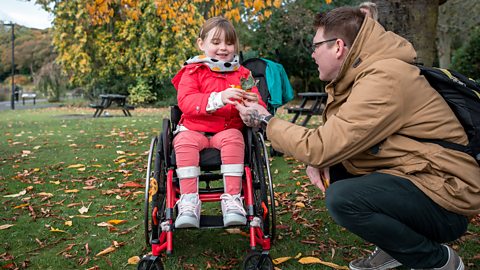
It doesnŌĆÖt even have to be something that you need to think about too much. ŌĆ£Babies, from when they are very little, are already using all of their senses to investigate and explore their environment,ŌĆØ explains Alys.
ŌĆ£So itŌĆÖs something that children naturally do without parents having to set it up. What we can do, is make sure we allow and encourage our children to keep exploring using all their senses.ŌĆØ
What age can you start sensory play?
From the moment theyŌĆÖre born, your baby is ready for sensory play.
Even in the womb, your baby uses their senses to understand the world. By the time they are born, theyŌĆÖll already be able to recognise your voice and your smell.
With a newborn, sensory play can be as simple as blowing raspberries on their belly, gently tickling or massaging them, or just chatting about the world when youŌĆÖre out for a walk. As babies get older, you will find that these activities develop naturally.
ŌĆ£Maybe youŌĆÖve been playing peek-a-boo with your baby, and theyŌĆÖve enjoyed feeling the cloth on their face,ŌĆØ says Alys. ŌĆ£But now theyŌĆÖve got a bit too old for that, so they might start doing something different with the cloth.
ŌĆ£They might start putting it over both of you at once, and you can change up the activity by letting different amounts of light in, lifting or lowering the cloth, so they experience dark and light.ŌĆØ
The more they grow, the more their sensory play will adapt. ŌĆ£So you want to keep following your childŌĆÖs lead in the play,ŌĆØ Alys explains. ŌĆ£If they get bored of a certain type of sensory play, theyŌĆÖll soon start exploring it differently.ŌĆØ
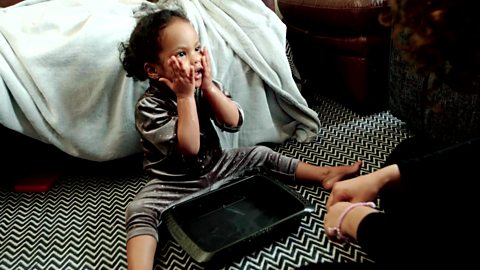
What are the benefits of sensory play?
ŌĆ£ItŌĆÖs through all of our senses that we make links between what we see, what we feel and what we hear,ŌĆØ explains Alys. ŌĆ£And this, ultimately, helps our children to make sense of the world.ŌĆØ
Exploring the world through their senses can help children understand lots of different things, such as ŌĆ£cause and effectŌĆØ (how their actions affect the world) and to develop their emotional awareness.
ŌĆ£Through sensory play, some children will discover which senses are more calming for them,ŌĆØ says Alys. ŌĆ£For some, itŌĆÖs music. For some, itŌĆÖs a more tactile feeling, like being wrapped in a blanket. Then for others, itŌĆÖs having certain smells around them.ŌĆØ Understanding what soothes you is a really useful skill for children to have as they grow up.
Sensory play also helps your little oneŌĆÖs attention span. When a child is hands-on with an experience, theyŌĆÖll stay engaged with it for longer than if they just listen to someone talking.
How does sensory play help with language learning?
Sensory play helps your childŌĆÖs language learning too, as linking experiences with their senses helps children to remember the words that went with them.
ŌĆ£If I asked you to think of a swimming pool,ŌĆØ Alys says. ŌĆ£You would probably think about the smell of the chlorine, the heat of the room and the sound reverberating around the place."
Adults immediately link to all of their senses when recalling a word. So you can see how giving children all of that sensory information helps them learn words more easily.
When your child experiences a word with more than one of their senses, their brain will create more connections to that word. ŌĆ£You want to incorporate the senses together,ŌĆØ Alys explains. ŌĆ£Engaging with as many senses as possible is going to give them a much clearer memory link to a word.ŌĆØ
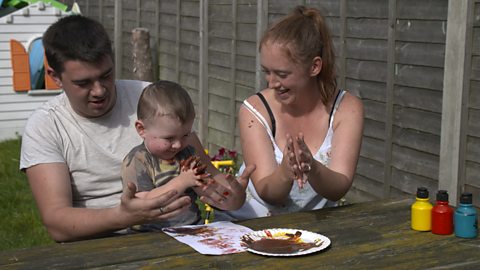
AlysŌĆÖs top tips for making the most of sensory play
1. DonŌĆÖt expect your child to play in a set way
Children wonŌĆÖt always do the things you expect them to. ŌĆ£Let them do what they want with the activity,ŌĆØ Alys explains. ŌĆ£Because they will know which senses are going to help them learn the most and also what theyŌĆÖre ready for.ŌĆØ
2. Follow their lead
Letting your child take the lead in sensory play is important.
ŌĆ£Little children will want to touch, feel, smell and put things to their mouth,ŌĆØ Alys says. ŌĆ£They want to use all of their senses to learn, and this is something that we, as adults, might unconsciously try to interrupt.ŌĆØ
Similarly, when it comes to messy experiences, Alys says: ŌĆ£Let them get messy if thatŌĆÖs what they want. But some children will not want to get messy or hands-on, so itŌĆÖs about letting your child go at their own pace.ŌĆØ
3. Try to link in other senses
ŌĆ£Parents can help with sensory play by talking about what theyŌĆÖre experiencing and labelling that,ŌĆØ Alys says.
ŌĆ£If you are doing some water play, for example and your child is focusing on the noise that the water makes, use words like ŌĆśsplashŌĆÖ, ŌĆśdripŌĆÖ. You could also link in other senses, by putting your hand under the splashing or dripping water, which might encourage your child to touch too.ŌĆØ
ŌĆ£By using more than one of their senses in play, your child will make more brain connections. This will really boost their language learning.ŌĆØ
4. Keep it simple
Sometimes the simpler sensory activities can be the most beneficial for your child.
ŌĆ£Being out and about in real situations, where you can actually smell, hear and see things is the best kind of sensory play,ŌĆØ Alys says. ŌĆ£Getting out into nature is a great way for your child to experience new words in real life.ŌĆØ
ŌĆ£Water play is also really great fun. You can incorporate it into your everyday routine, like when youŌĆÖre washing your hands. When you do that, you can feel the water, smell the soap and see the bubbles.ŌĆØ

